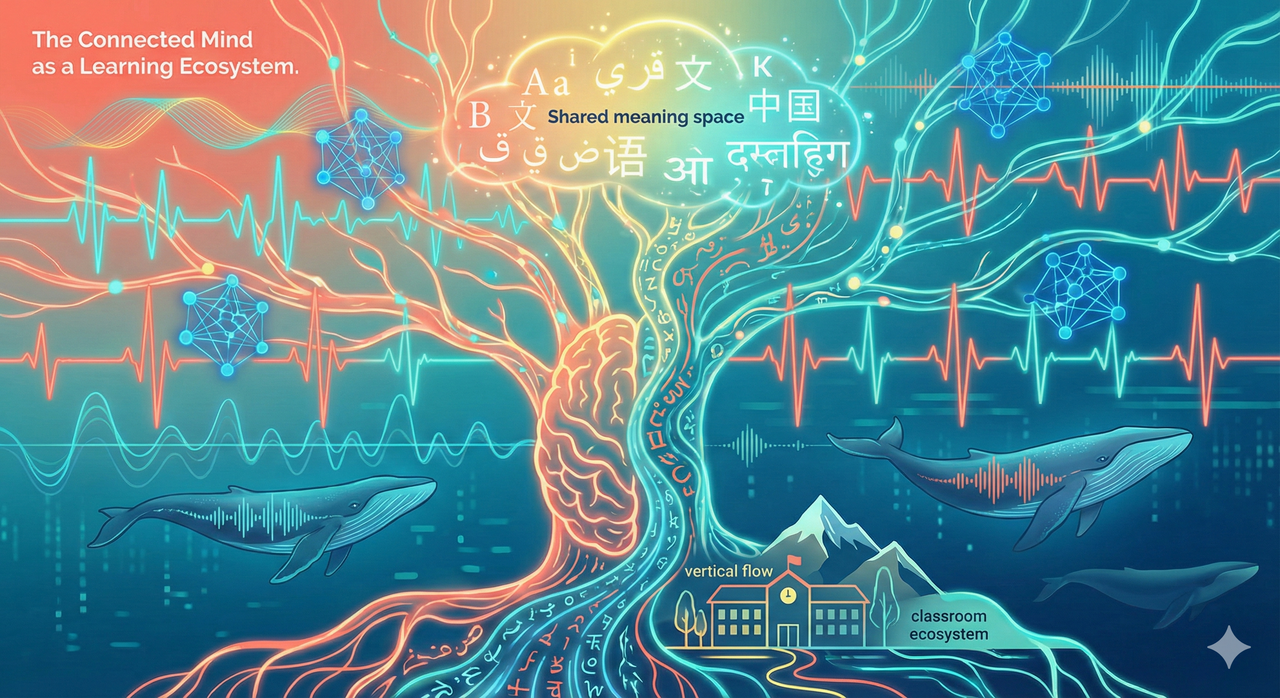In the course of skimming research articles, every now and then something surfaces that is comprehensive, clarifying, and just flat out fun to read because it brings illumination to something I’ve been grappling with.
One I want to make sure to bring to your attention, just in case you haven’t yet read it, is this open access piece from Verhoeven and Perfetti, Universals in Learning to Read Across Languages and Writing Systems. As I’ve been learning a lot more about learning how to read and write in English, as well as about the process of language development in general, I sometimes worry that not everything I learn may generalize well, especially to languages whose writing and phonological systems differ quite substantially from English. Here’s where the paper comes in as a great resource, because the authors offer—as noted in the title—some universal principles across a number of languages, and highlight some key differences.
They highlight, for example, the extreme difficulty of English spelling among alphabetic writing systems due to its “syllabic complexity” and lack of consistent and transparent mapping of phonology. But the difficulty of learning any alphabetic writing system is nothing compared to the complexity of Chinese, which blows all other writing systems out of the water.
They also have a lovely table that compares some of the major writing and language systems to one another descriptively, which I know is a resource I will return to in the future.
https://www.tandfonline.com/doi/full/10.1080/10888438.2021.1938575?scroll=top&needAccess=true
In the course of this high-level examination, the authors also do us another service, which is to render intricate and complex ideas from various studies on reading into short, clear sentences.
For example, I’ve recently written about the transformation of my own thinking around phonemic awareness, and here’s Verhoeven and Perfetti succinctly stating the current state of PA research:
“Evidence in alphabetic languages for the late association between phonemic awareness and literacy suggests that phonemic awareness and learning to read alphabetically can develop reciprocally. This means that phonemic awareness is an enabler rather than a prerequisite for alphabetic reading.”
Or the need for spelling practice — something we increasingly neglect or dismiss in the U.S.:
“An important cross-linguistic finding is that spelling practice helps children internalize orthographic structures.”
There are also some interesting critiques of the Simple View of Reading in the section on comprehension:
“[the] simple view is incomplete in accounting for development of reading skill because reading itself brings about the learning of vocabulary and experience with a wider variety of grammatical structures and text types that are not experienced in typical spoken language (outside of academic lectures). Reading also increases the general knowledge that is needed to support comprehension.”
At the center of this critique is the role of vocabulary, which spans across linguistic and conceptual knowledge:
“Because so much of vocabulary is acquired following beginning reading, it is not simply a store of language knowledge waiting to be unlocked by decoding. Word meanings are continuously being retrieved, learned, and fine-tuned by reading itself. Both the quality of specific word knowledge (lexical quality) and the quantity of known words are important in supporting comprehension (Perfetti, 2007; Perfetti & Hart, 2001). It might seem convenient to subsume vocabulary under spoken language comprehension and thereby have a two-factor model of reading comprehension. However, this would fail to capture some observations about word meanings. For example, vocabulary knowledge directly supports identification of words that have exceptional spellings (Ricketts, Nation, & Bishop, 2007). A model that allows a more direct influence of knowledge of word meanings on reading comprehension may be more appropriate across languages (see Verhoeven & van Leeuwe, 2008). Beyond beginning reading, where only spoken language vocabulary is available, word meanings are not intrinsically part of spoken language more than written language. In both cases, they are the central connection point between coded input and comprehension, as much a component of a reading system as a language system (Perfetti & Stafura, 2014).”
I thought this was interesting in a couple of ways. First, because this resonates with my own experience as someone who read quite a lot in my formative years, and thus a large amount of the vocabulary I possess is purely in the written form — I can read it and write it, but may not have had much exposure to it in spoken language nor use it in my own speech. Second, because it brought me back to a similar critique that Mark Seidenberg made against the SVR in some endnotes to Reading at the Speed of Light, in which he states, “The main weakness in Gough’s theory is that it did not make sufficient room for the ways that the components influence each other. Vocabulary, for example, is jointly determined by spoken language and reading. Vocabulary can also be considered a component of both basic skills and comprehension.”
More to say on this additional variance for sure, but I’ll save it for another post! In the meantime, read this paper by Verhoeven and Perfetti with a pen in hand so you can mark it up yourself! I hope you enjoy it as much as I do. There’s a ton of gems in there to examine more in depth.
Discuss...
#language #literacy #phonemicawareness #orthography #multilingualism #reading #SVR #writing

